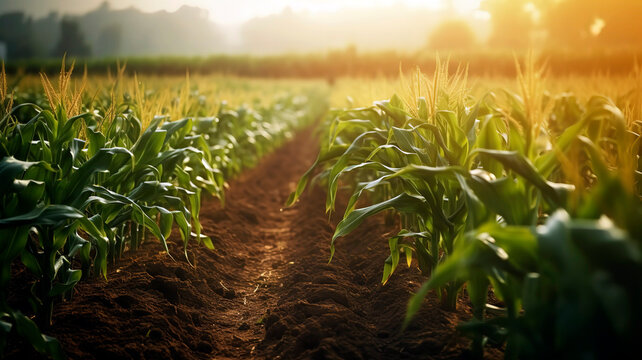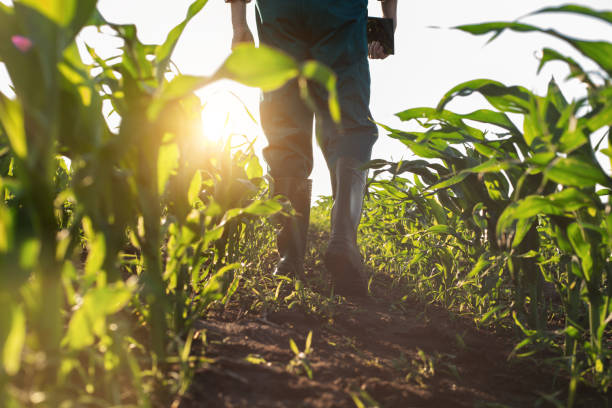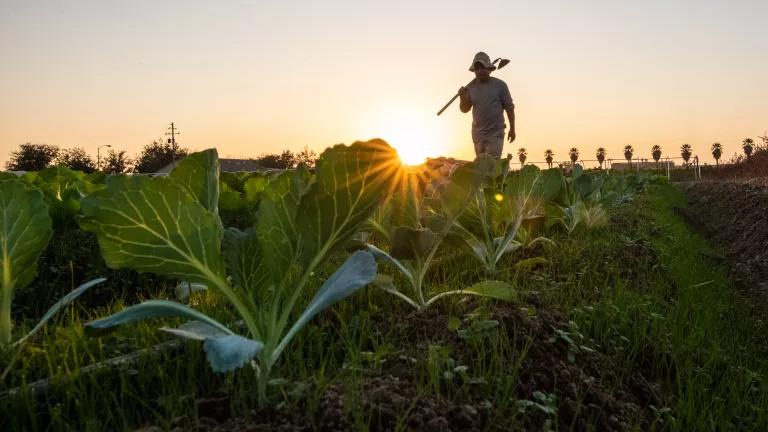ORGANIC AND SUSTAINABLE FARMING
Organic and sustainable farming is an integrated system of farming that values environmental health, biodiversity, and the welfare of farming families. This practice focuses on utilizing natural processes and materials, avoiding the use of synthetic fertilizers and pesticides. Through crop rotation, composting, and the inclusion of livestock, organic farming not only improves the fertility of the soil but also drives a balanced ecosystem. Farmers who follow these methods frequently see their crops more resistant to pests and diseases, resulting in healthier yields and decreased need for chemical treatments.
Aside from the environmental advantages, Organic and sustainable farming practices also impact the local economy and public health. Locally sourced food and the support given to small-scale farmers benefit consumers with fresher food as well as the local community. Such strategy promotes local market and food system development, which will result in improved food security as well as smaller carbon footprints of long-distance transportation. In addition, sustainable agriculture practices tend to promote the welfare of animals, keeping the livestock in humane conditions, which aligns with increasing consumer demands for ethical food production.
Converting to Organic and sustainable farming is not without difficulty, but the pay-off over the long term is substantial compared to the initial obstacles. Farmers will have to pay more upfront and learn as they transition away from conventional practices. Rewards, though, are healthier soil, higher yields over the long term for crops, and a more robust agricultural system capable of coping with the effects of climate change. With increased awareness of the need for sustainable practices, more farmers are adopting this system, opening the way for a future where agriculture can flourish alongside nature.
Healthy Soil. Healthy Crops. Healthy Lives.
At EverPura AgriDairy Treat Foundation, we believe that truly sustainable farming must nourish the soil, respect nature’s cycles, and empower farmers. Our mission is to promote organic, eco-friendly, and cost-effective agricultural practices that restore soil health, reduce reliance on chemicals, and ensure a better future for rural communities.
Our Approach
Organic Fertilizers & Composting: We provide vermicompost, jeevamrit, cow dung-based manure, and farm composting systems, enriching soil naturally and eliminating chemical dependency.
Bio-Pesticides & Plant-Based Protection: We teach the use of neem extracts, garlic-chili sprays, and biological controls to combat pests without harming soil life or the environment.
Natural Crop Management: Our techniques include crop rotation, intercropping, mulching, and green manuring to maintain long-term soil fertility and prevent disease buildup.
We offer continuous support to help farmers not just grow organically, but also thrive:
Formation of Organic Clusters & FPOs: We encourage group farming through cluster development and the creation of Farmer Producer Organizations (FPOs), enabling collective input procurement and market linkage.
Market Linkages for Organic Produce: We connect farmers to local markets, organic exhibitions, retail stores, and B2C e-commerce platforms to ensure fair and consistent returns.
Sustainable Tech Integration – Future-Ready Farming
We integrate climate-smart and renewable energy solutions into our farming models to build long-term resilience:
Solar Energy for Farms: We promote and facilitate solar-powered irrigation pumps, dryers, and lighting solutions to reduce electricity costs and ensure a reliable power supply, even in remote areas.
Biogas Units for Clean Energy: We provide training on setting up household and community-level biogas plants using cow dung and organic waste. These systems reduce reliance on firewood or LPG, provide clean cooking fuel, and produce nutrient-rich slurry as a by-product for fields.
Water-Saving Irrigation Systems: We encourage drip irrigation, sprinkler systems, and moisture-retaining soil practices for efficient water use.
Impact
– Reduced Input Costs through organic inputs, solar energy, and on-farm biogas use.
– Increased Incomes from premium pricing, lower energy bills, and value-added products.
– Rejuvenated Soils & Ecosystems that are rich in biodiversity and microbial activity.
– Empowered Rural Communities equipped with green technology and climate resilience.
– Cleaner Energy Adoption, reducing dependence on fossil fuels and deforestation.
10 Essential Tips for Organic and Sustainable Farming
- Know Your Soil: Have a detailed soil test to analyze its pH, nutrient content, and organic matter. The data will be used for selecting the appropriate crops and fertilizers to boost soil health and fertility.
- Select Native Plants: Use crops and plants that occur naturally in your area. Such species are more suited to conditions at home, consume less water, and are more resistant to pests and disease, ensuring a more environmentally friendly farming practice.
- Adopt Crop Rotation: Rotate your crops season after season to avoid soil depletion and minimize pest and disease accumulation. This method maintains the fertility of the soil and is capable of increasing yields in the long run.
- Apply Organic Pest Control: Instead of using chemical pesticides, try natural pest control strategies like releasing beneficial insects, applying neem oil, or growing pest-repelling crops. This not only reduces damage to the environment but also encourages biodiversity.
- Practice Companion Planting: Cultivate mutually compatible plants alongside each other to support growth and repel pests. For instance, growing marigolds together with vegetables will repel destructive insects but attract beneficial insects.
- Compost Frequently: Set up a composting system to recycle yard trimmings and kitchen waste. Compost adds nutrients to the soil, enhances soil structure, and supports healthy microbial populations, critical for plant development.
- Save Water: Adopt water-conserving methods like drip irrigation or rainwater collection. These help minimize water loss and provide your crops with enough moisture without excessive resource usage.
- Reduce Tillage: Limit tilling to a minimum to preserve soil structure and avoid erosion. No-till or reduced-till agricultural practices conserve soil health and promote soil organisms that are beneficial.
- Crop Diversification: Plant a mix of crops to build a robust farm system. Crop diversity can enhance soil health, minimize pest infestations, and offer a more consistent income during the year.
- Learn Continuously: Educate yourself on the newest sustainable farming techniques and organic approaches. Participate in workshops, read publications, and get in touch with near-local farming communities to exchange information and learn from each other.
Organic and sustainable agriculture are terms used to describe farm techniques emphasizing environmental quality, diversity, and the health of agricultural communities. Organic and sustainable agriculture does not use synthetic chemicals and genetically modified living things but instead relies on natural systems and renewable resources. The significance of sustainable and organic farming is that it can produce food while safeguarding ecosystems, enhancing soil health, and minimizing pollution, ultimately leading to a more resilient food system. By promoting these methods, consumers are making their planet healthier and guaranteeing that the next generation will have access to nutritious and safe food.
Organic and sustainable farming practices are rapidly popular for many compelling reasons. These methods prefer environmental health by reducing the use of harmful chemicals and promoting biodiversity, which helps maintain ecosystem. Additionally, organic farming often leads to healthy food options, as it avoids synthetic pesticides and fertilizers, leading to safe production for consumers. By supporting local economies and reducing carbon footprints through permanent practices, these farming methods contribute to the more flexible food system. Finally, the selection of biological and durable farming is not only about personal health; It is about promoting a healthy planet for future generations.
Biological and durable farming provides benefits for a wide range of individuals and groups. Farmers adopting these practices can improve soil health and biodiversity, which can cause better crop yield over time. Consumers benefit from healthy, chemical-free yield, which can increase their overall welfare. Additionally, local communities get from permanent farming through increasing economic opportunities and promoting environmentally friendly practices. Even the planet itself receives prizes, as these methods help reduce pollution and preserve natural resources, including organic and durable farming, winning for all those involved.



